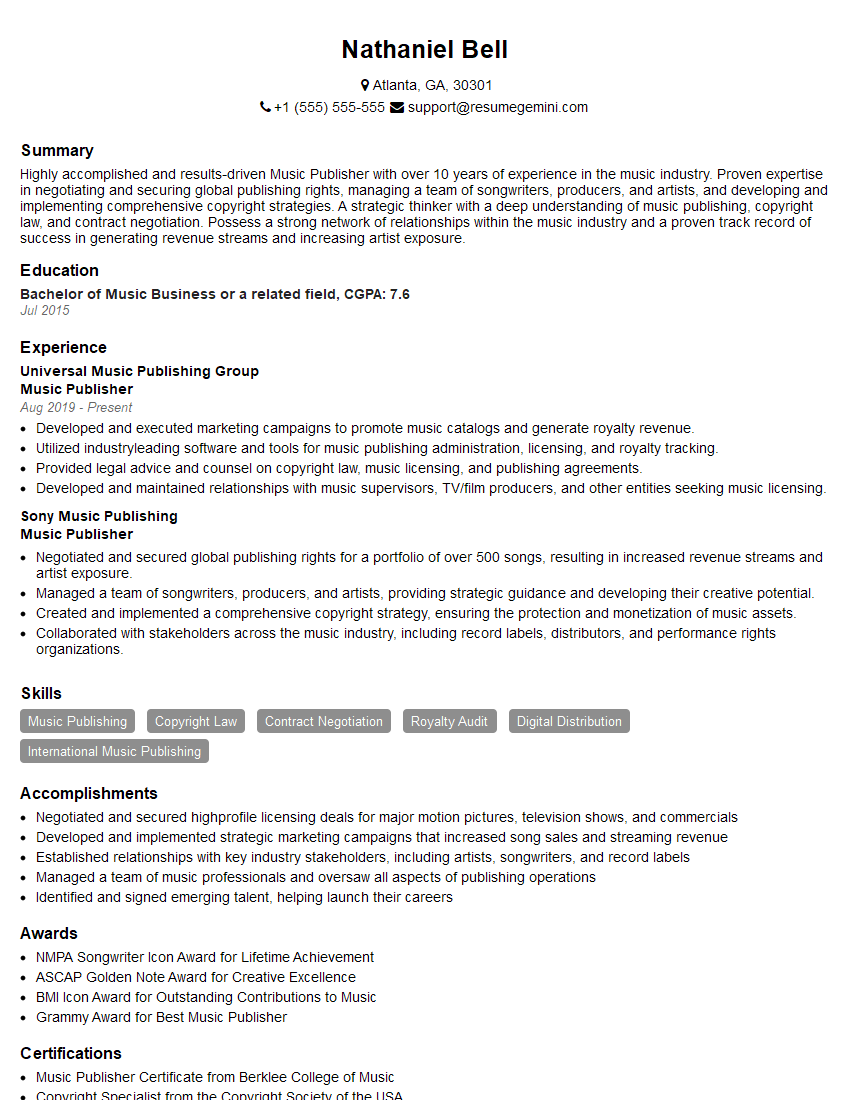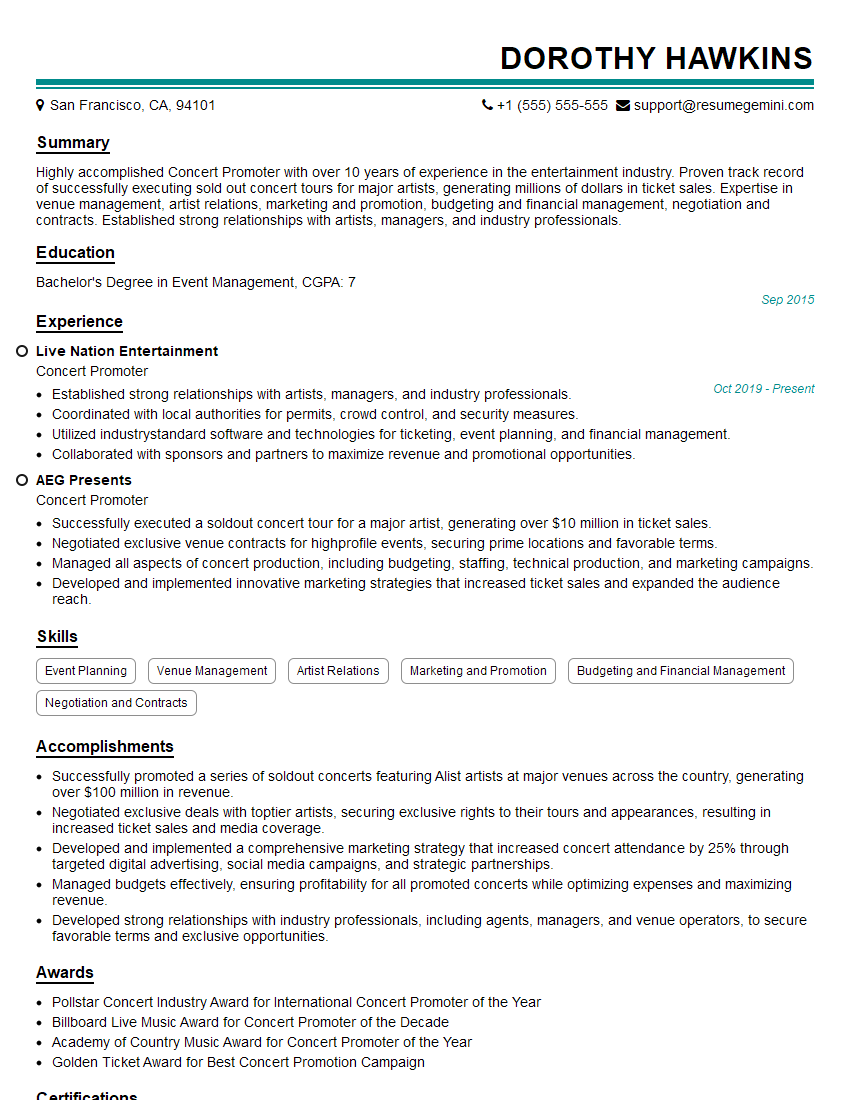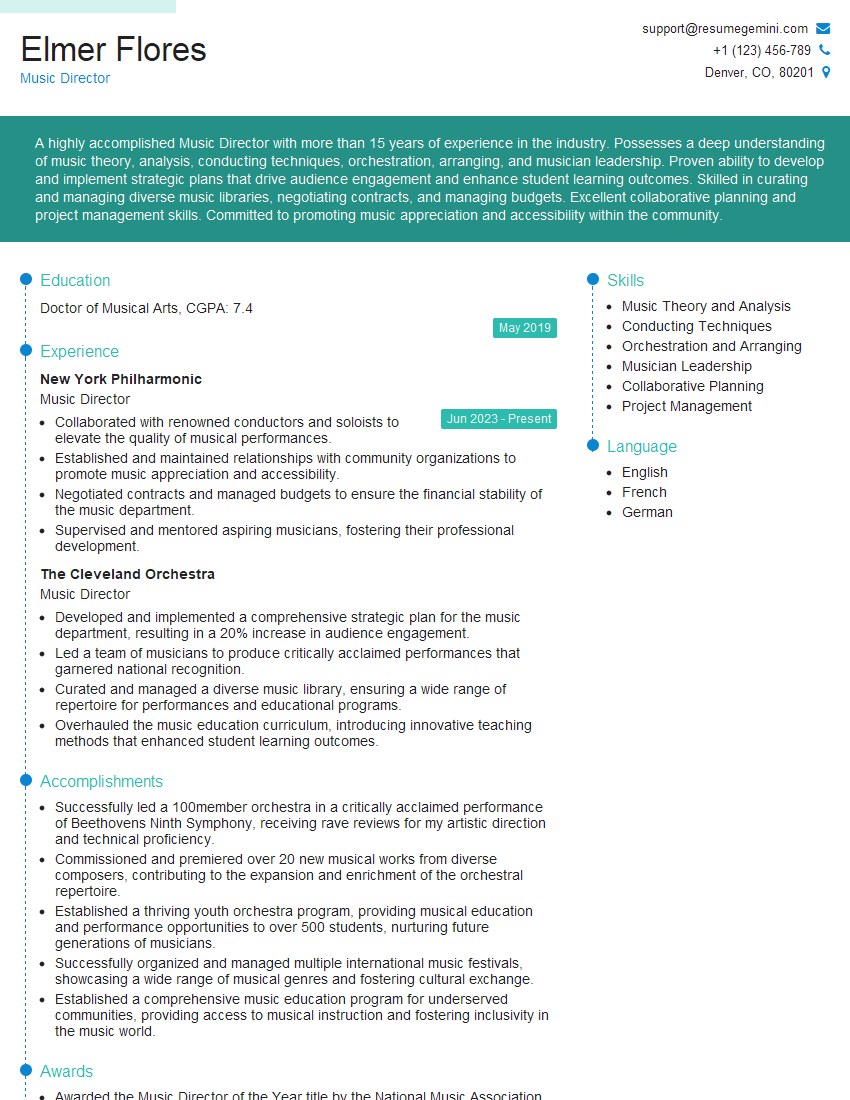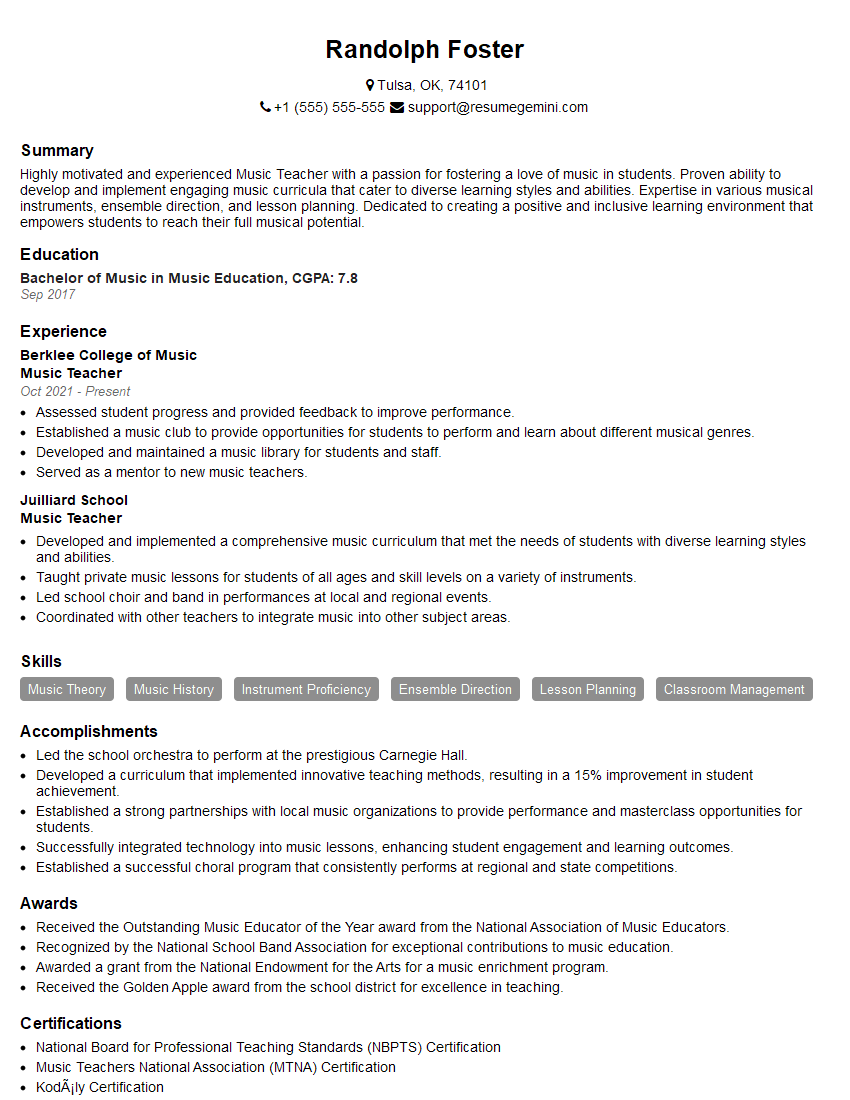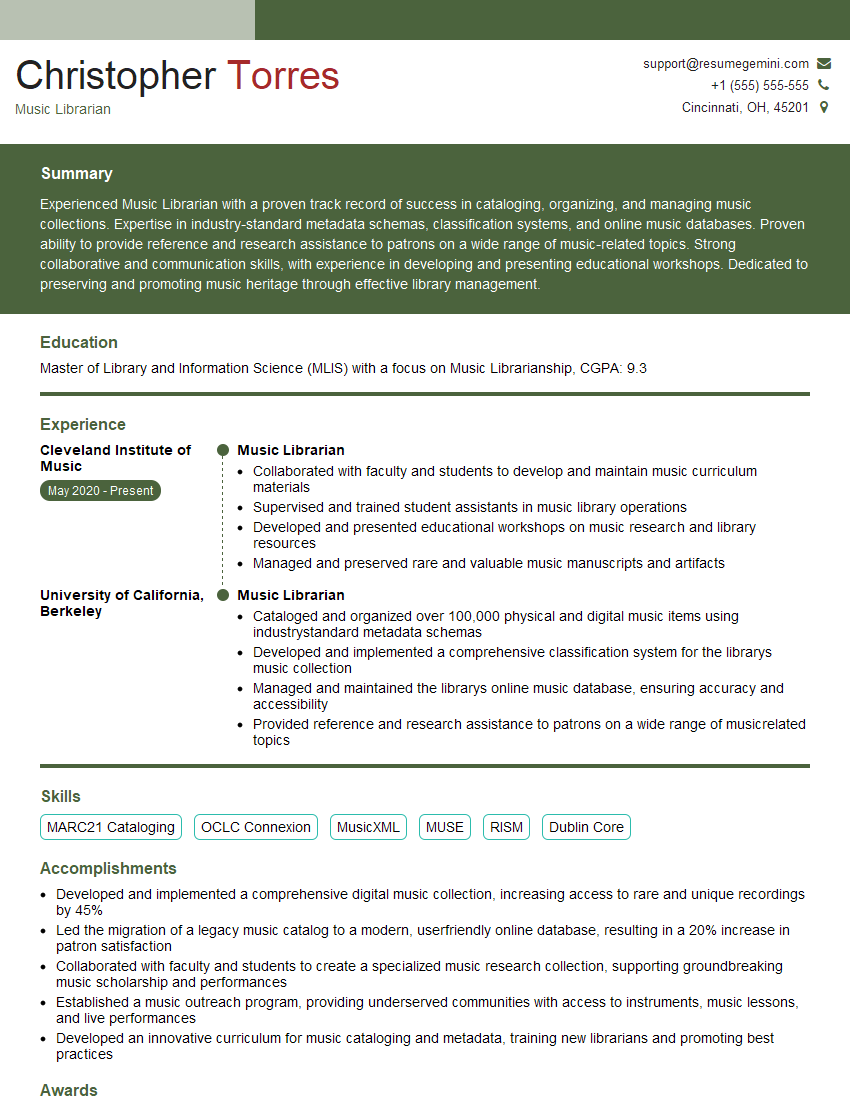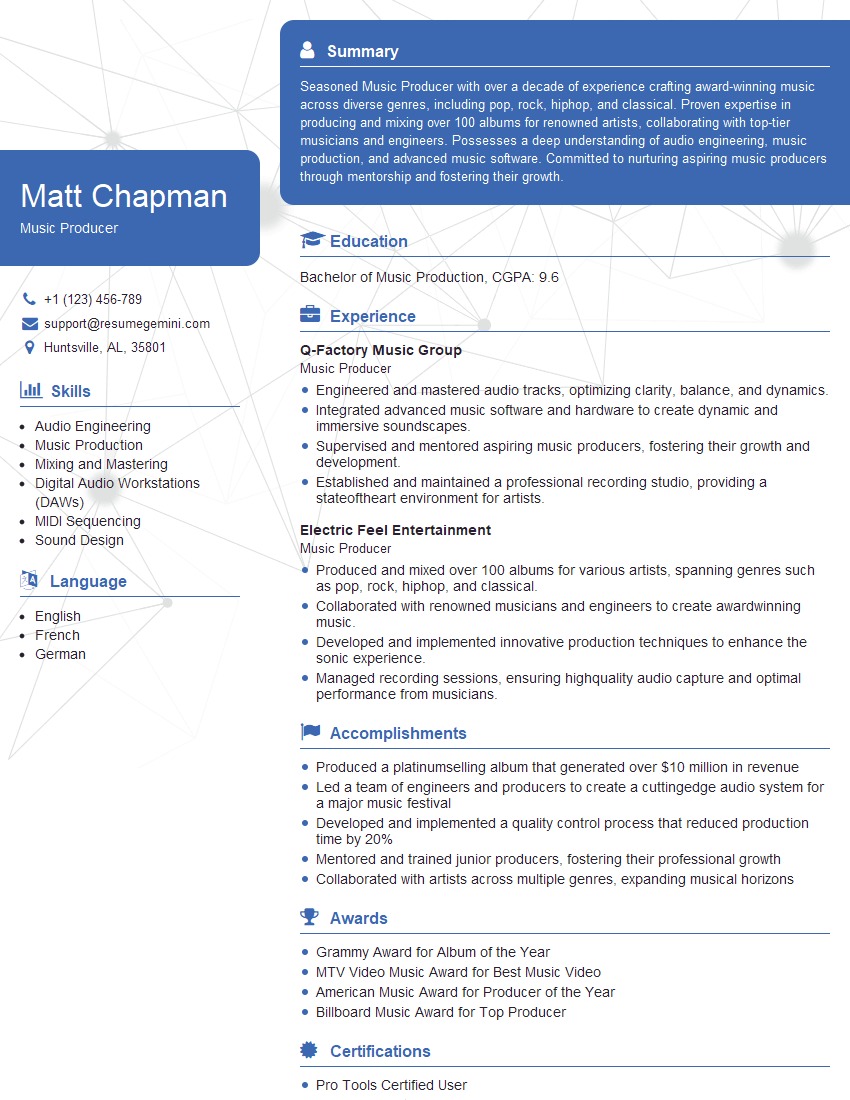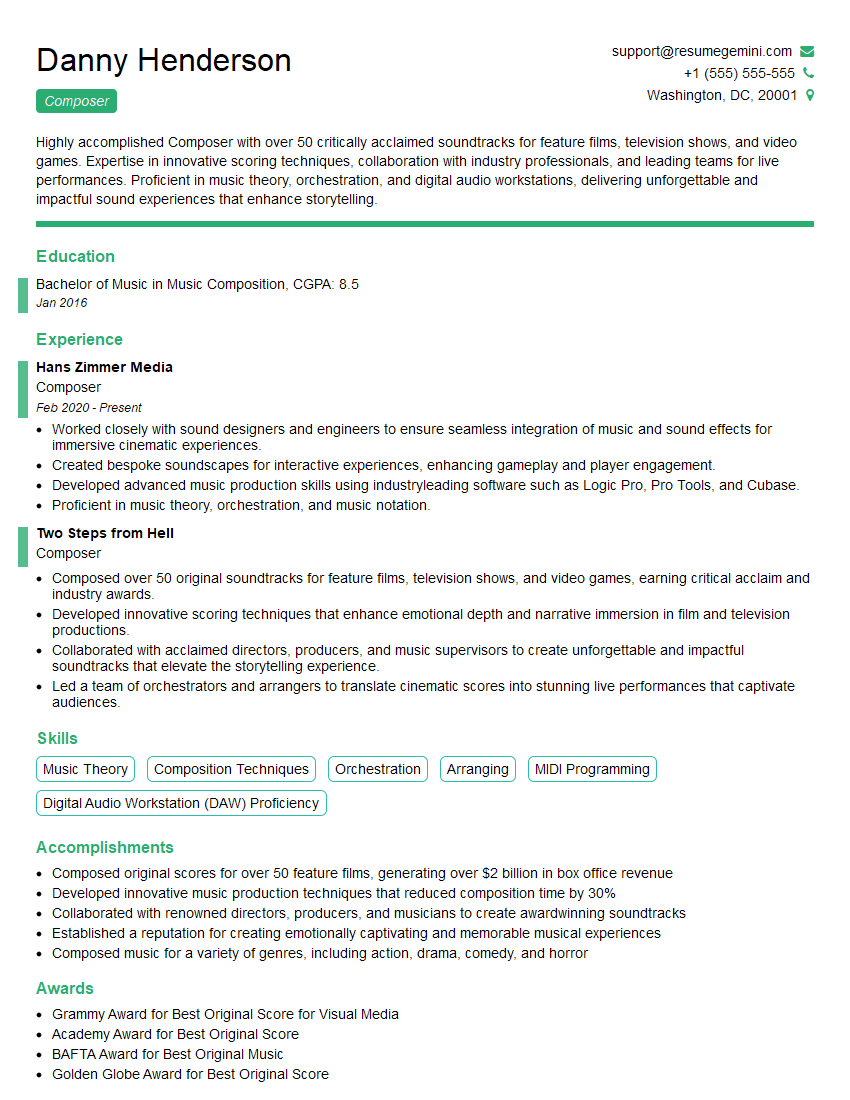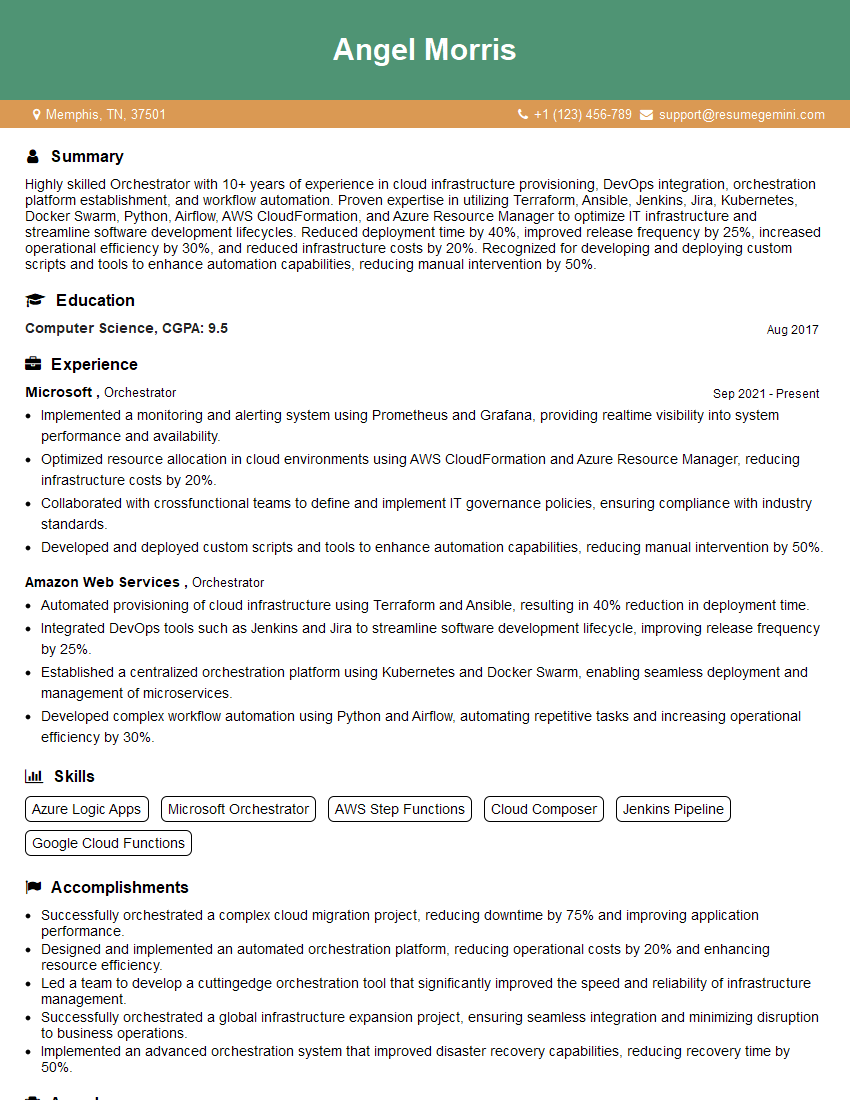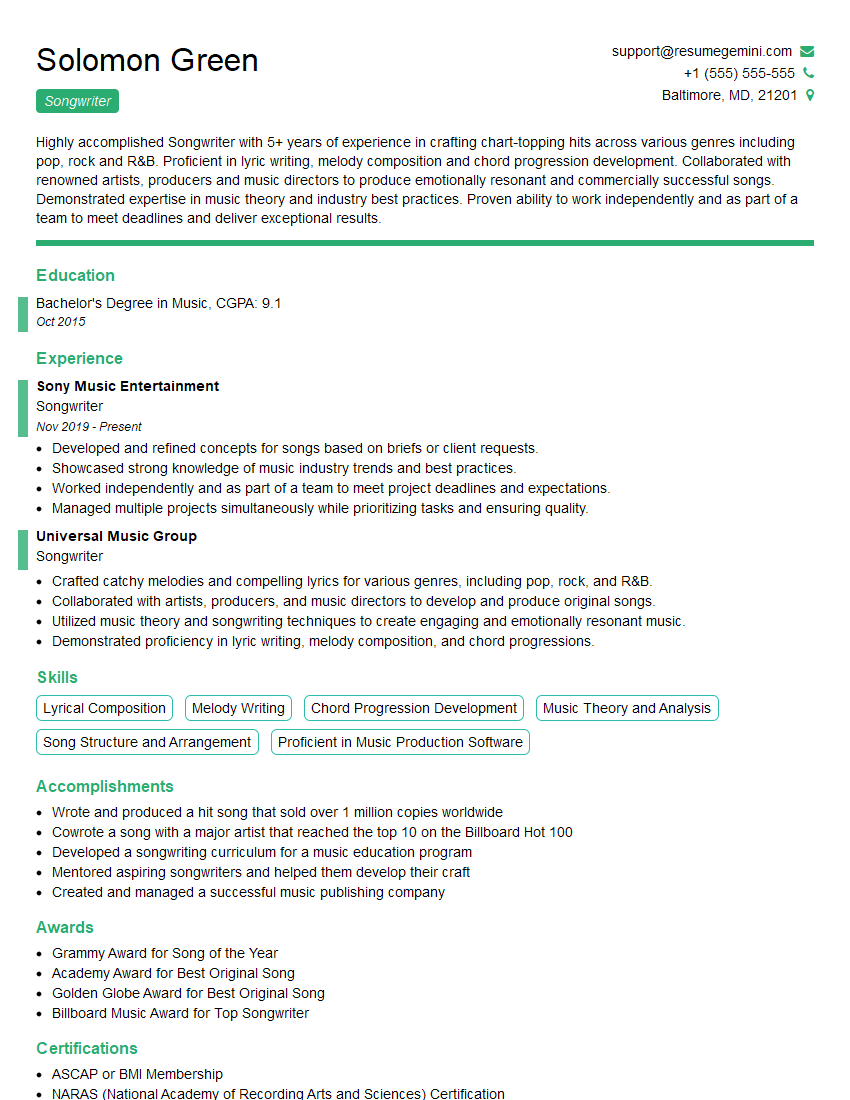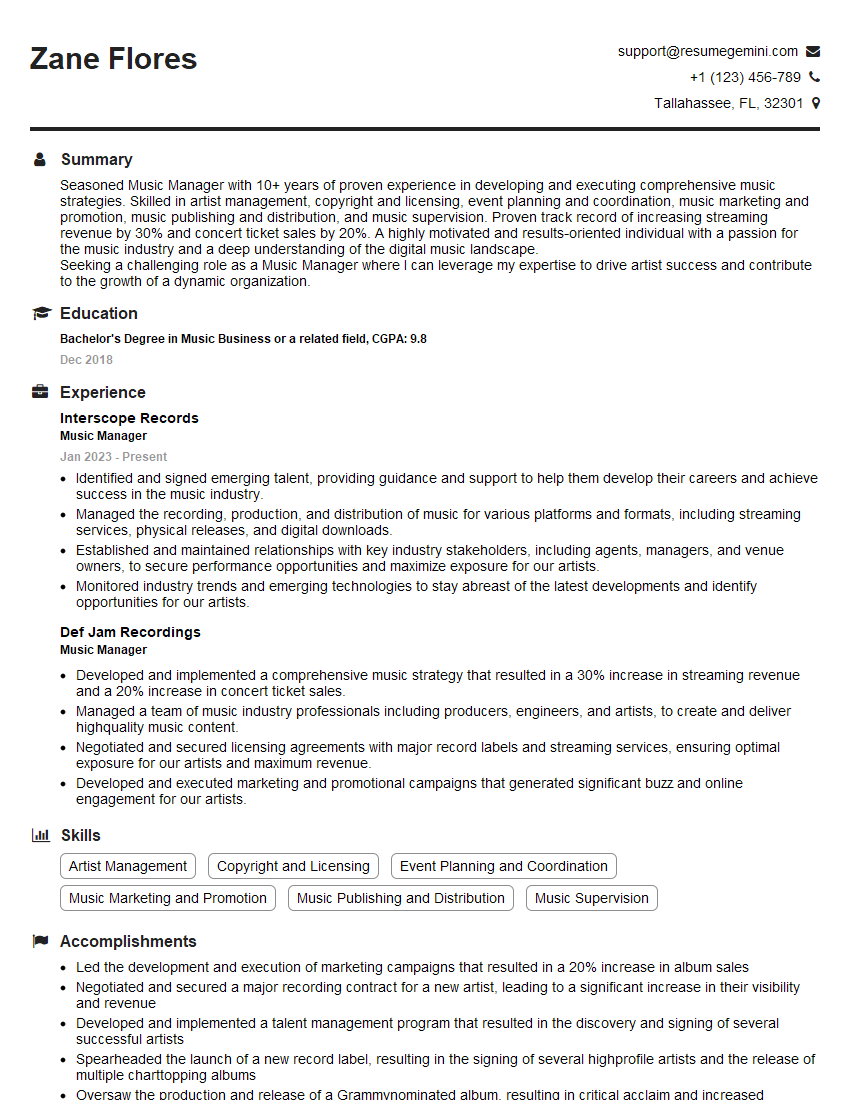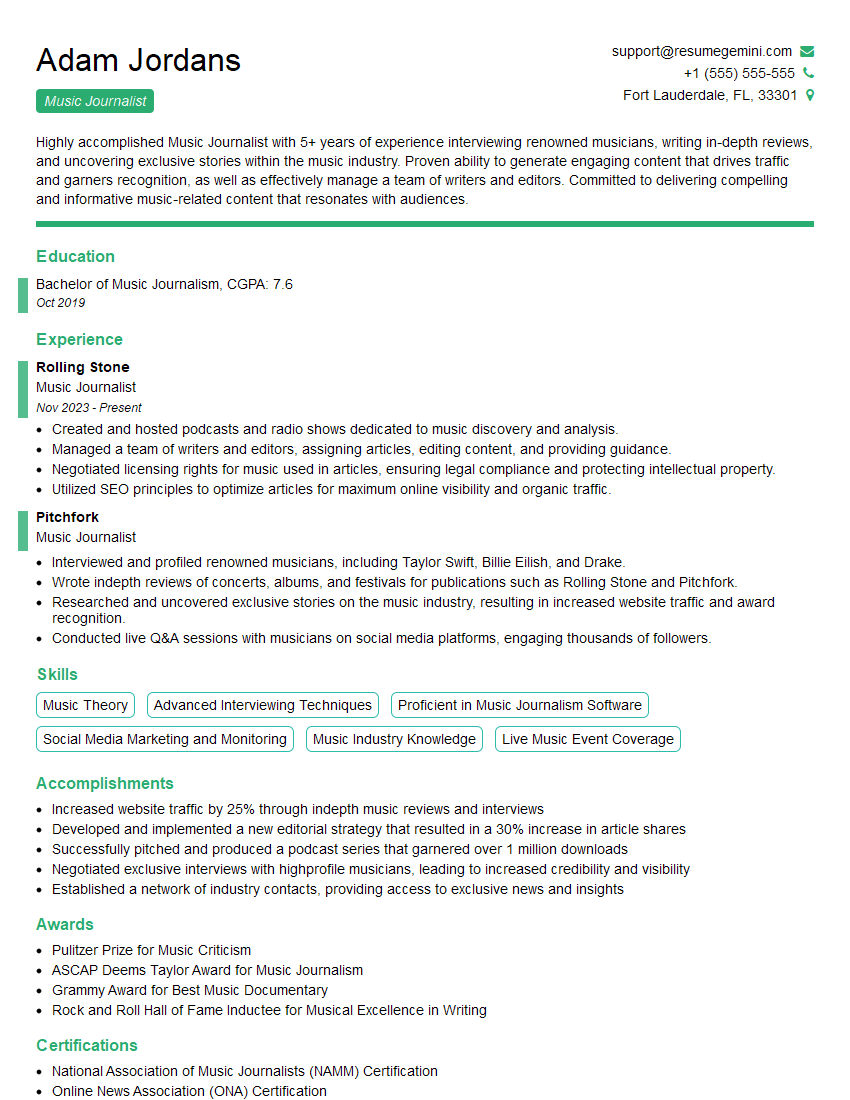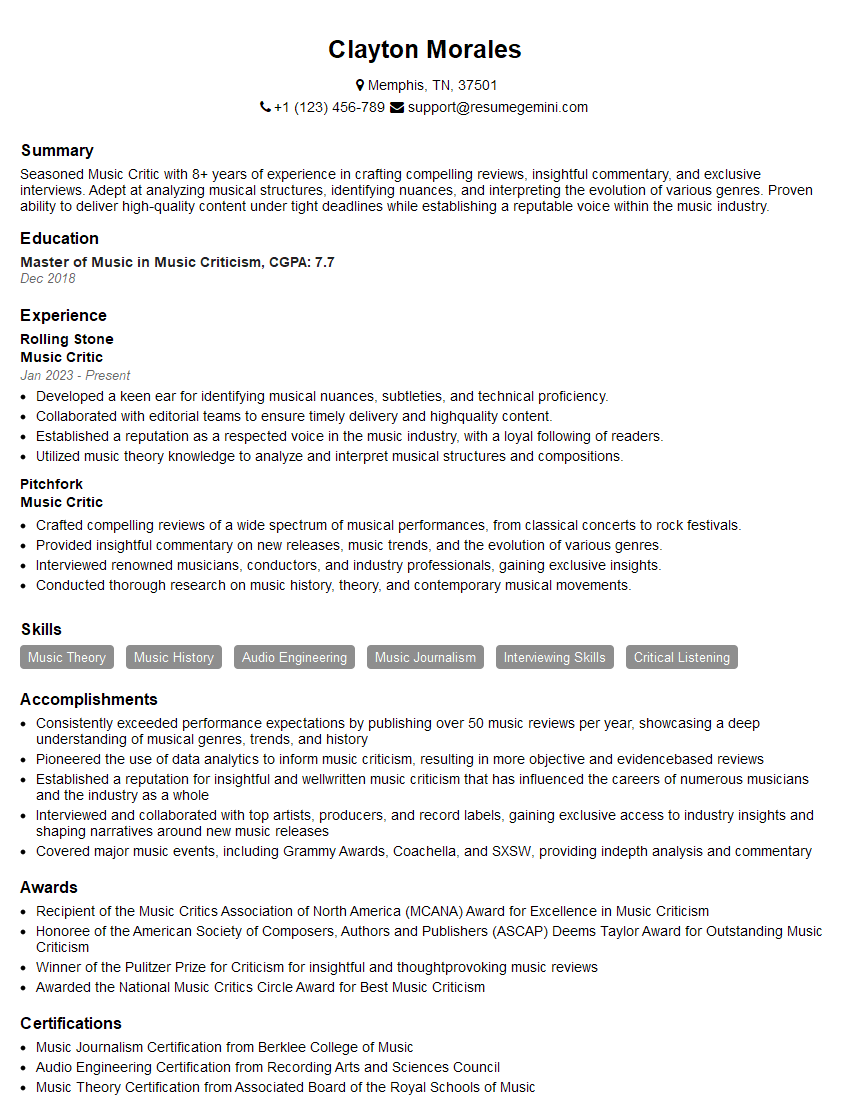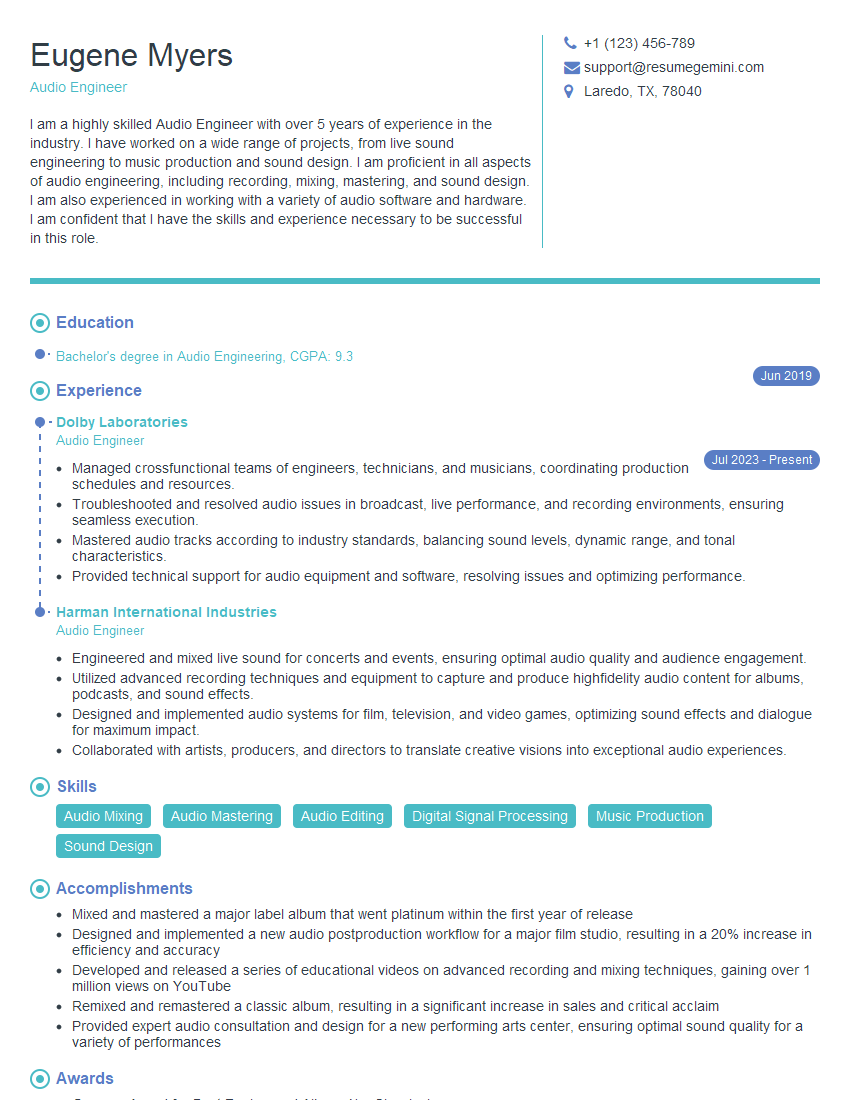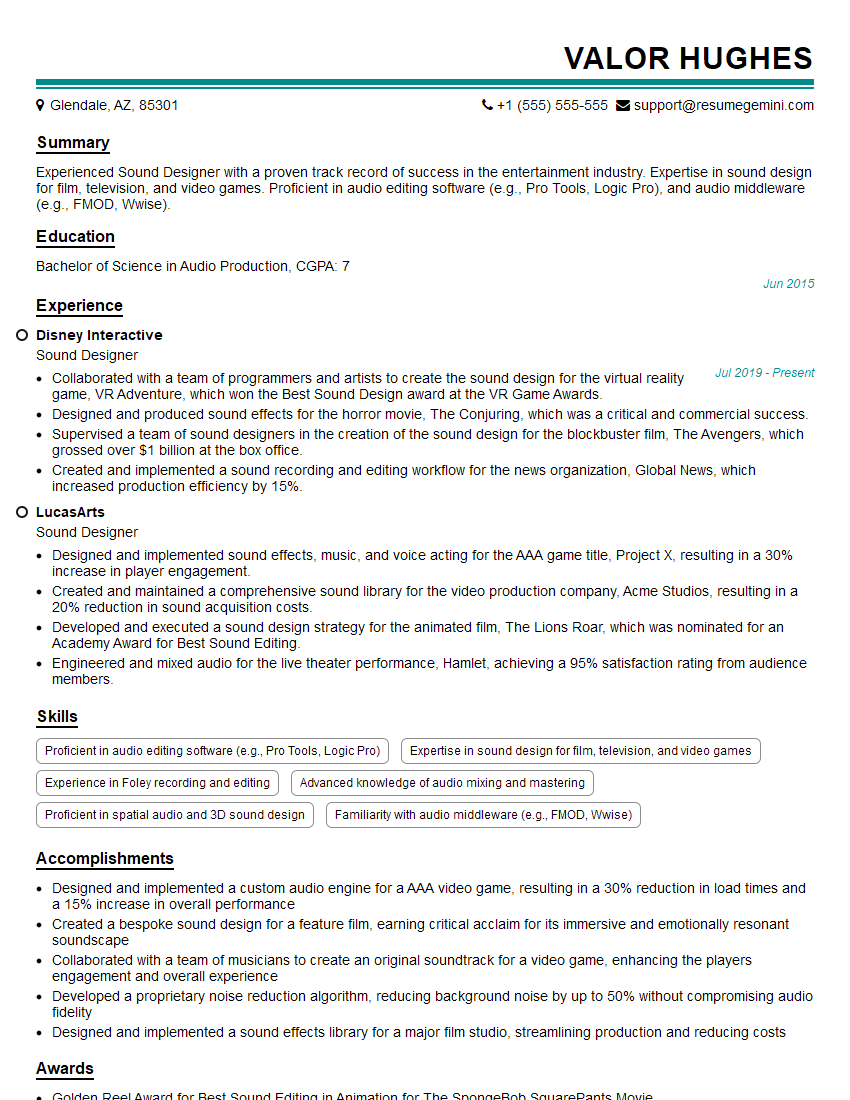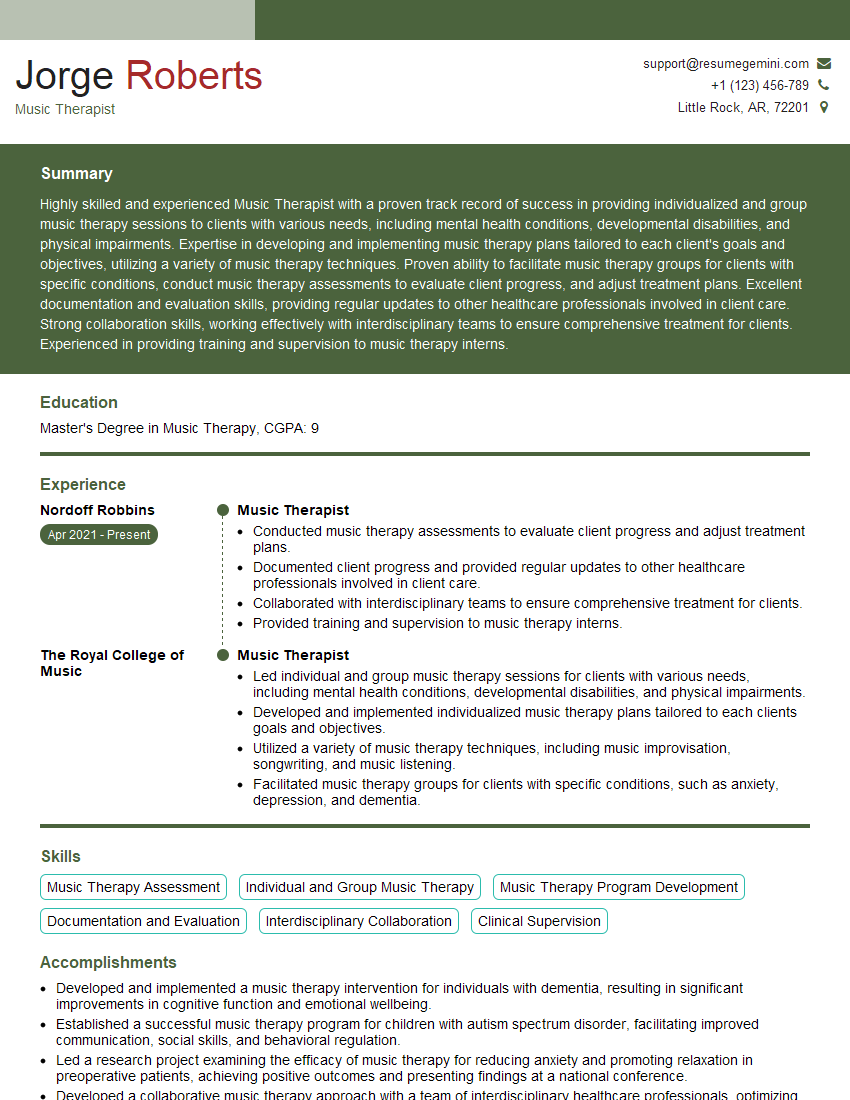Cracking a skill-specific interview, like one for Passionate About Music, requires understanding the nuances of the role. In this blog, we present the questions you’re most likely to encounter, along with insights into how to answer them effectively. Let’s ensure you’re ready to make a strong impression.
Questions Asked in Passionate About Music Interview
Q 1. Describe your experience with different music genres.
My experience with music genres spans a wide range, from classical and jazz to contemporary pop, electronic, and even some experimental forms. I’ve not only listened extensively to these genres but also actively engaged with their underlying structures and compositional techniques. For instance, studying the intricate harmonic progressions in jazz allowed me to appreciate the improvisation inherent in the genre, while analyzing classical structures like sonata form honed my understanding of formal composition. My exposure to electronic music has broadened my perspective on sound design and digital audio manipulation. This diverse background helps me approach musical projects with versatility and creativity, adapting to various styles and incorporating elements from different genres in unique ways.
- Classical: Deep understanding of form, harmony, and orchestration, evidenced by my arranging of several orchestral pieces.
- Jazz: Proficiency in improvisation, chord voicings, and rhythmic complexities. I’ve performed in several jazz combos.
- Pop: Familiar with song structures, contemporary production techniques, and lyrical crafting. I’ve co-written and produced several pop songs.
- Electronic: Extensive knowledge of synthesizers, drum machines, and digital audio workstations (DAWs). I’ve produced several electronic music tracks.
Q 2. What software or tools are you proficient in for music production/editing?
My proficiency lies in several industry-standard software and tools for music production and editing. I’m highly skilled in using Digital Audio Workstations (DAWs) such as Ableton Live, Logic Pro X, and Pro Tools. I’m comfortable working with virtual instruments (VSTs) and effects plugins, including those from Native Instruments, Waves, and FabFilter. My skills also extend to audio editing software like Audacity for simpler tasks. Beyond DAWs, I’m proficient in notation software like Sibelius and Finale for creating scores and arranging parts for different instruments. I also utilize various audio processing tools for mastering and mixing, ensuring high-quality final products.
Example: In Ableton Live, I frequently use MIDI clips to program melodies and rhythms, then utilize various effects like reverb and delay to shape the sound.Q 3. Explain your understanding of music theory (e.g., scales, chords, harmony).
My understanding of music theory is comprehensive, encompassing various elements like scales, chords, harmony, rhythm, and form. I’m fluent in different scales (major, minor, modal, etc.), understanding their characteristics and how they contribute to the overall mood and feel of a piece. I’m adept at identifying and constructing chords, understanding their function within a key and how they create harmonic progressions. Harmony is central to my compositional process, and I have a firm grasp of concepts like consonance, dissonance, and voice leading. Knowledge of rhythmic notation and different time signatures is fundamental, enabling me to create complex and interesting rhythmic patterns. Finally, I’m versed in various musical forms, like sonata form, rondo form, and twelve-bar blues, which inform my structural decisions in composition.
For instance, understanding the difference between a major and minor scale allows me to instantly convey different emotions; a major scale is generally perceived as happy and bright, while a minor scale tends to be melancholic or somber.
Q 4. How do you approach composing music for a specific mood or setting?
Composing for a specific mood or setting requires a multi-faceted approach. I begin by carefully considering the desired emotional impact and the overall atmosphere. For example, if I need to create a piece that evokes feelings of peace and serenity, I might choose gentle melodies, slow tempos, and calming harmonies using major chords and perhaps some modal scales. Conversely, a piece meant to express excitement and energy might involve faster tempos, more complex rhythms, and perhaps the use of dissonances and dynamic contrasts. The instrumentation plays a crucial role; for instance, strings might be used for a somber mood, while brass could be used for a majestic or triumphant feel. The choice of instruments and the way they are arranged contributes greatly to the overall texture and emotive quality of the music. I often begin with a simple melodic idea or harmonic progression, and then gradually develop it into a fully realized piece.
Q 5. Discuss your experience with live music performance or recording sessions.
I have extensive experience in both live music performance and recording sessions. I’ve performed in various settings, from intimate coffee shop gigs to larger concerts, playing both as a soloist and as part of ensembles. These experiences have honed my stage presence and ability to connect with an audience. In the studio environment, I’ve been involved in several recording projects, both as a performer and a producer. This has given me a deep understanding of the technical aspects of recording, including microphone placement, signal processing, and mixing. I’m comfortable working with various instruments and recording techniques, striving for high-quality recordings that accurately capture the musical vision.
One memorable recording session involved tracking a string quartet. We meticulously placed microphones to capture the individual instruments’ nuances while achieving a balanced overall sound.
Q 6. What are your preferred methods for music arrangement and orchestration?
My preferred methods for music arrangement and orchestration involve a combination of traditional and contemporary techniques. I typically begin with a basic sketch of the piece, outlining the melody, harmony, and rhythm. I then consider the instrumentation, choosing instruments that best suit the mood and style of the music. For orchestration, I often utilize notation software like Sibelius to create detailed scores, meticulously arranging parts for each instrument. I pay close attention to voice leading, ensuring that the different instrumental parts complement each other harmoniously. I also utilize various techniques like counterpoint and layering to create richer textures. The arrangement process is iterative; I often make revisions and adjustments based on playback and feedback, ensuring the final arrangement is balanced and effective.
Q 7. How do you stay updated on current trends and developments in the music industry?
Staying current with industry trends is crucial. I achieve this through various methods. I regularly listen to new releases across diverse genres, attending concerts, and exploring online music platforms. I follow influential artists, producers, and labels on social media and subscribe to relevant music publications and blogs. Industry conferences and workshops provide valuable insights into emerging technologies and creative approaches. Participating in online forums and communities dedicated to music production allows me to exchange ideas and learn from other professionals. Analyzing charts and sales data helps me understand listener preferences, and this informs my creative process.
Q 8. Describe your experience with music copyright and licensing.
Music copyright and licensing are crucial for protecting creators’ rights and ensuring fair compensation for their work. Copyright, automatically granted upon creation, gives the creator exclusive rights to reproduce, distribute, display, perform, and create derivative works from their music. Licensing, on the other hand, grants others permission to use the music under specific terms and conditions.
My experience encompasses both sides. I’ve registered my own compositions with copyright organizations, understanding the importance of documentation and legal protection. I’ve also navigated the licensing landscape, securing licenses for samples or using pre-existing music in my projects, always ensuring compliance with copyright laws. For example, I once needed to license a sample from a classic jazz track for a remix. This involved contacting the copyright holder, negotiating the terms, and securing a written agreement detailing permitted uses and payment schedules.
Understanding different types of licenses is crucial. Creative Commons licenses offer various levels of permission, from allowing free use with attribution to restricting commercial applications. Understanding these nuances is key to legally and ethically using copyrighted material.
Q 9. How would you handle a conflict with a fellow musician or collaborator?
Conflicts with collaborators are unfortunately inevitable. My approach prioritizes open communication and respectful dialogue. I believe in establishing clear expectations and roles from the outset of a project, documenting these in a written agreement if possible. This helps prevent misunderstandings later on.
If a conflict arises, I try to address it directly and calmly. I’ll listen to the other person’s perspective, seeking to understand their concerns. We then work collaboratively to find solutions that address everyone’s needs. For example, I once had a disagreement with a collaborator over the direction of a song. Instead of arguing, we sat down, discussed our individual visions, and ultimately found a compromise that incorporated elements from both perspectives, resulting in a richer, more nuanced piece.
If direct communication doesn’t resolve the issue, mediation by a neutral third party might be necessary. The key is to prioritize preserving the creative partnership while addressing the conflict constructively.
Q 10. Explain your approach to music criticism or analysis.
Music criticism or analysis involves dissecting a musical work to understand its structure, form, and emotional impact. My approach combines technical analysis with a subjective interpretation. I start by identifying the musical elements – melody, harmony, rhythm, instrumentation, and form – analyzing their interplay. For example, I might examine the harmonic progression in a jazz solo, noting the use of chromaticism and its contribution to the overall emotional tone.
Beyond the technical aspects, I delve into the emotional and expressive dimensions of the music. I consider the cultural context, the composer’s intent (if known), and the overall feeling evoked by the music. It’s not just about identifying notes and chords but also about understanding why these choices were made and their effect on the listener. I might compare similar musical ideas used by different composers to pinpoint the nuances and originality of a certain passage. Ultimately, good music analysis involves a blend of objective observation and subjective response, presenting a reasoned and insightful perspective.
Q 11. What is your preferred workflow for music composition or production?
My workflow for music composition and production is iterative and highly adaptable. It usually begins with an idea – a melody, a rhythmic pattern, or a mood. I often sketch these initial ideas using a digital audio workstation (DAW), such as Ableton Live or Logic Pro X. I build upon these sketches, layering sounds, experimenting with different instrumentation, and refining the arrangement until it feels cohesive and compelling.
I work in stages. First, I focus on songwriting and composition. Then, I move on to arrangement, deciding on the instrumentation and overall structure. Next comes recording, mixing, and finally mastering. Throughout the entire process, I frequently review and revise my work, seeking feedback and continuously making refinements. This iterative approach allows for flexibility and creativity. I might start with a simple acoustic guitar melody and gradually add layers of synthesizers, drums, and vocals until I’ve achieved the desired sound. My workflow is always evolving based on the project’s needs and stylistic requirements.
Q 12. How do you approach troubleshooting technical issues in music production?
Troubleshooting technical issues is a significant part of music production. My approach is systematic and methodical. I start by identifying the specific problem – is it a software glitch, a hardware malfunction, or a problem with my audio settings? I use a process of elimination to pinpoint the source of the issue.
For example, if I’m experiencing audio dropouts, I might first check my audio interface connections. If that doesn’t solve the problem, I might examine my DAW’s buffer size settings or check for conflicting software. Online forums and documentation are invaluable resources. Searching for error messages or descriptions of similar issues often yields solutions. If a hardware problem is suspected, I might try a different cable or piece of equipment to isolate the faulty component.
A logbook documenting setup, troubleshooting and resolutions is very helpful for keeping track of hardware and software performance to better prevent issues. Sometimes, however, the issue may require technical assistance from a specialist, but using this methodical approach will help you provide all the information required.
Q 13. Describe your understanding of audio mixing and mastering techniques.
Audio mixing and mastering are critical for achieving a polished and professional-sounding recording. Mixing involves balancing the levels of individual tracks – instruments, vocals, effects – to create a cohesive and pleasing sonic landscape. Mastering is the final stage, where the overall mix is optimized for various playback systems (e.g., streaming services, CDs).
In mixing, I focus on creating a clear and balanced sonic image. This includes equalizing frequencies to remove muddiness or harshness, using compression to control dynamics, and adding effects such as reverb and delay to create space and depth. I pay close attention to stereo imaging, ensuring instruments are positioned effectively in the stereo field. Mastering, on the other hand, involves subtle adjustments to enhance the overall loudness, clarity, and dynamic range of the finished track, preparing it for distribution across various platforms.
I use specialized mastering plugins to achieve a consistent and professional-sounding master. The goal is not just to make the music loud, but to optimize its sonic qualities for the intended listening environment. I’m aware of the importance of proper loudness standards for different platforms. For instance, streaming services might have specific loudness targets that need to be met.
Q 14. How do you incorporate feedback into your musical projects?
Feedback is essential for improvement. I actively solicit feedback from trusted sources throughout the creation process. This might include fellow musicians, producers, or even potential listeners. I value both constructive criticism and positive reinforcement.
I use a structured approach to incorporate feedback. I’ll often create a feedback form or document, outlining specific areas where I’m seeking input. I’ll also listen carefully to the feedback and consider its validity and relevance to my goals for the project. For instance, if I get several comments about a particular section sounding muddy, I’ll revisit the mix, applying EQ adjustments and compression to clarify the sounds.
Not all feedback is equally valuable. I weigh the feedback based on the source’s expertise and my own artistic judgment. Sometimes, I might incorporate feedback directly, making changes based on suggestions. Other times, I might use feedback as a source of inspiration, considering the suggestions but ultimately making my own creative decisions.
Q 15. Describe a time you overcame a challenge in a musical project.
During the production of my last album, “Echoes of the City,” we faced a significant challenge: securing funding for the final mastering and distribution phase. We had poured our hearts and souls into the music, but we were severely under-budget. Instead of giving up, we developed a comprehensive crowdfunding campaign. We created compelling videos showcasing our creative process, highlighting the unique aspects of the album. We also offered tiered rewards, ranging from digital downloads to exclusive merchandise and even private listening parties. Through meticulous planning and engaging our fanbase directly, we exceeded our funding goal by 20%, proving that resourcefulness and direct audience engagement can overcome significant financial hurdles in music production.
Career Expert Tips:
- Ace those interviews! Prepare effectively by reviewing the Top 50 Most Common Interview Questions on ResumeGemini.
- Navigate your job search with confidence! Explore a wide range of Career Tips on ResumeGemini. Learn about common challenges and recommendations to overcome them.
- Craft the perfect resume! Master the Art of Resume Writing with ResumeGemini’s guide. Showcase your unique qualifications and achievements effectively.
- Don’t miss out on holiday savings! Build your dream resume with ResumeGemini’s ATS optimized templates.
Q 16. What are your strengths and weaknesses as a musician?
My greatest strength as a musician lies in my versatility and adaptability. I’m comfortable across multiple genres, from jazz improvisation to electronic music production, and I’m always eager to learn new techniques and styles. I’m also a strong collaborator, valuing teamwork and open communication in creative projects. However, one area I’m continually working on is self-promotion. While I’m confident in my musical abilities, marketing myself effectively is a challenge. I’m actively seeking to improve this through workshops and learning from more experienced artists in the industry.
Q 17. What are your career goals in the music industry?
My long-term career goal is to establish myself as a respected and influential composer and producer, working across various media—film, video games, and independent music projects. I aim to create emotionally resonant music that connects with audiences on a deep level. I envision collaborating with other talented musicians and artists, pushing creative boundaries, and contributing to the evolution of musical storytelling. Specifically, I want to build a small, yet highly effective team, fostering a collaborative and supportive working environment. This includes mentorship, teaching, and eventually establishing my own small studio.
Q 18. How do you handle constructive criticism of your work?
I approach constructive criticism as an invaluable opportunity for growth. I believe that no piece of art is perfect, and feedback, even if initially difficult to hear, provides insights that can significantly elevate the quality of my work. I listen carefully to any criticism offered, asking clarifying questions if something is unclear. Then, I analyze the feedback objectively, separating subjective opinions from actionable suggestions. I implement changes only if I feel they genuinely improve the piece; maintaining my artistic vision while integrating valuable perspectives. For example, when a collaborator critiqued the rhythm section of a song, I adjusted the tempo and groove to match their suggestion, leading to a stronger, more captivating feel.
Q 19. Describe your experience with music education or teaching.
I have extensive experience in music education. For five years, I taught private piano lessons to students ranging in age from 8 to 60. My teaching philosophy focuses on nurturing a student’s passion for music, tailoring my approach to their individual needs and goals. I emphasize not only technical proficiency but also musicality, creativity, and a strong understanding of music theory. I utilize a variety of teaching methods, including traditional sheet music instruction, improvisation exercises, and collaborative projects to cultivate a comprehensive musical experience. This experience provided me with valuable insights into various learning styles and the art of effective communication, skills that I find highly transferable to collaborative musical projects.
Q 20. What is your understanding of different musical styles and their historical context?
My understanding of musical styles spans various eras and genres. I’m deeply familiar with the evolution of classical music, from the Baroque period with its ornate counterpoint to the Romantic era’s emotional intensity. I also possess a strong grasp of the development of jazz, from its roots in New Orleans to its diverse modern forms. I’m well-versed in popular music genres such as rock, pop, and electronic music, tracing their historical lineages and identifying key stylistic influences. For instance, I can analyze how the blues profoundly impacted rock and roll, or how disco’s influence can still be heard in contemporary pop.
Q 21. How do you use technology to enhance your musical creativity?
Technology plays a crucial role in my musical creativity. I use Digital Audio Workstations (DAWs) such as Ableton Live and Logic Pro X for composition, recording, mixing, and mastering. I employ virtual instruments and effects plugins to expand my sonic palette and experiment with unique sounds. For example, I frequently utilize synthesizers to create atmospheric textures and rhythmic patterns. I also leverage music notation software such as Sibelius to create detailed scores and arrangements. Furthermore, online collaboration platforms facilitate remote sessions with other musicians, regardless of geographical location. This integration of technology allows me to explore new musical territories and bring my creative vision to life with greater precision and flexibility.
Q 22. Discuss your experience with music marketing and promotion.
Music marketing and promotion are crucial for reaching audiences and building a sustainable career. My approach is multifaceted, encompassing both digital and traditional strategies. I leverage social media platforms like Instagram, TikTok, and YouTube to connect with fans directly, posting engaging content such as behind-the-scenes glimpses into the creative process, short performance clips, and interactive Q&A sessions. This helps build a personal connection and foster a loyal community. Beyond social media, I actively pursue collaborations with other artists and influencers for cross-promotion, increasing reach and exposure to new audiences. I also believe strongly in email marketing to build a dedicated list of subscribers who receive updates on new releases, tour dates, and exclusive content. Finally, I utilize press releases and pitching to music blogs and media outlets to secure reviews and interviews, elevating my profile and credibility within the music industry.
For example, during the promotion of my last EP, I partnered with a local coffee shop to host a live acoustic set and giveaway, generating buzz both online and within the community. I also created a series of short videos demonstrating the creative process behind each song, which boosted engagement on my social media significantly.
Q 23. How do you collaborate effectively with other musicians or professionals?
Effective collaboration hinges on clear communication, mutual respect, and a shared vision. Before embarking on any project, I prioritize establishing open dialogue with fellow musicians and professionals to understand individual strengths, goals, and expectations. This involves actively listening to their input and ideas, ensuring everyone feels heard and valued. I find that using project management tools like Trello or Asana can be incredibly beneficial for tracking progress, assigning tasks, and maintaining accountability. A collaborative spirit is essential; I’m always open to feedback and compromise, believing the best results come from a collective effort, not individual dominance. A successful collaboration is built on trust and a willingness to learn from one another, fostering creativity and innovation.
For instance, in a recent recording session, I worked closely with a sound engineer to experiment with different recording techniques and effects to achieve a specific sonic texture. By actively incorporating their expertise, we created a richer and more nuanced final product than either of us could have achieved independently.
Q 24. Explain your approach to music performance or presentation.
My approach to performance prioritizes audience connection and emotional engagement. It’s about more than just technical proficiency; it’s about storytelling. Before a performance, I thoroughly plan the setlist, considering the flow and pacing to create a cohesive and captivating experience. I incorporate dynamic changes in tempo and intensity to maintain audience interest, and I use visual elements like lighting and stage presence to enhance the overall impact. I also value improvisation and spontaneity, allowing moments for genuine interaction with the audience. Crucially, I tailor my performance style to the context, whether it’s an intimate acoustic set or a high-energy concert. The goal is always to create an unforgettable experience, leaving the audience feeling moved and inspired.
For example, during one performance, I spontaneously invited an audience member to sing a verse with me, creating a unique and memorable moment that reflected the interactive and inclusive nature of my performances.
Q 25. What is your philosophy regarding musical innovation and experimentation?
My philosophy on musical innovation centers on embracing experimentation while maintaining a foundation of musicality and integrity. I believe that pushing creative boundaries is crucial for growth and artistic expression. This involves exploring new genres, experimenting with unconventional instruments and sounds, and incorporating technology to enhance the creative process. However, it’s important to approach experimentation thoughtfully. The goal isn’t to simply be different for the sake of it, but to meaningfully explore new sonic territories that express something profound. I strive to balance innovation with a respect for musical tradition, using experimentation as a means of enriching, not undermining, the core elements of music.
For instance, in my latest project, I combined traditional acoustic instrumentation with electronic elements, creating a unique soundscape that blended organic warmth with modern electronic textures.
Q 26. How do you manage your time and prioritize tasks in a musical project?
Managing time effectively in a musical project requires meticulous planning and prioritization. I typically begin by outlining all tasks involved, breaking them down into smaller, manageable steps. Then, I utilize project management tools, like a simple to-do list or a more sophisticated software like Asana, to schedule tasks based on deadlines and dependencies. This allows me to visualize the overall progress and identify potential bottlenecks. I set realistic goals and avoid overcommitting, acknowledging that creative work can be unpredictable. Regular self-assessment and adjustment are critical; I periodically review my progress and adjust my schedule as needed to account for unexpected delays or opportunities. Most importantly, I allocate dedicated blocks of time for specific tasks, minimizing distractions to optimize productivity and avoid burnout.
For example, when working on an album, I typically dedicate specific days to songwriting, recording, mixing, and mastering to maintain focus and avoid task-switching.
Q 27. Describe your experience with different musical instruments.
My instrumental proficiency spans several areas. I’m primarily a guitarist, proficient in both acoustic and electric guitar, with a strong understanding of various playing styles. I also have experience playing piano/keyboard and bass guitar. My proficiency in these instruments allows for versatility in songwriting, recording, and performance. Beyond these core instruments, I have a foundational understanding of percussion instruments, which has enriched my creative process and expanded my compositional palette. Continual learning is an integral part of my musical journey, and I regularly explore new instruments and techniques to further refine my abilities.
This allows me to contribute to various aspects of my projects – from composing and arranging to performing and recording.
Q 28. What steps do you take to ensure the quality of your musical work?
Ensuring the quality of my musical work involves a rigorous process that spans all stages of creation, from initial conception to final release. This begins with meticulous attention to detail during songwriting, ensuring that each element of the composition is thoughtfully crafted and contributes to the overall message and aesthetic. During recording, I collaborate closely with experienced engineers to capture the best possible sound quality, utilizing high-quality equipment and techniques. The mixing and mastering stages are equally crucial, where I pay attention to balance, clarity, and dynamic range. I utilize professional mastering services to ensure a polished and professional final product. Finally, I always seek feedback from trusted sources, incorporating constructive criticism to refine and improve the work before release. Continuous self-assessment and refinement are crucial in my workflow.
For example, I spent weeks refining the mix of my last single to ensure the nuances of each instrument were balanced and clear, leading to a significantly improved final product.
Key Topics to Learn for a Passionate About Music Interview
- Music Theory Fundamentals: Understanding basic music theory concepts like scales, chords, rhythm, and melody is crucial. Consider how these elements contribute to different musical styles and genres.
- Music History & Genres: Demonstrate knowledge of significant periods, composers, and influential artists across various genres. Be prepared to discuss the evolution and impact of different musical styles.
- Music Production & Technology: Familiarity with recording techniques, software (DAWs), and audio engineering principles is highly valuable. Be ready to discuss your experience with relevant tools and workflows.
- Music Business & Industry: Understanding the music industry landscape, including copyright, licensing, distribution, and marketing, will showcase your business acumen.
- Performance & Musicianship: If applicable, highlight your practical skills – instrumental proficiency, vocal ability, or conducting experience. Discuss your performance experience and its impact on your musical understanding.
- Music Analysis & Criticism: Develop your ability to critically analyze musical works, identifying key elements and providing insightful interpretations. This demonstrates a deep understanding and appreciation for music.
- Problem-Solving & Collaboration: Showcase your ability to troubleshoot technical issues, work effectively in teams, and contribute creatively to musical projects. Provide examples of your collaborative efforts.
Next Steps
Mastering the key concepts related to Passionate About Music is vital for career advancement in the dynamic music industry. A strong understanding of these areas will significantly enhance your interview performance and overall job prospects. Creating an ATS-friendly resume is crucial for getting your application noticed. We highly recommend using ResumeGemini to build a professional and impactful resume that highlights your skills and experience effectively. ResumeGemini provides excellent resources and even offers examples of resumes tailored to the Passionate About Music field to help you craft the perfect application.
Explore more articles
Users Rating of Our Blogs
Share Your Experience
We value your feedback! Please rate our content and share your thoughts (optional).
What Readers Say About Our Blog
Hi, I represent an SEO company that specialises in getting you AI citations and higher rankings on Google. I’d like to offer you a 100% free SEO audit for your website. Would you be interested?
Dear Sir/Madam,
Do you want to become a vendor/supplier/service provider of Delta Air Lines, Inc.? We are looking for a reliable, innovative and fair partner for 2025/2026 series tender projects, tasks and contracts. Kindly indicate your interest by requesting a pre-qualification questionnaire. With this information, we will analyze whether you meet the minimum requirements to collaborate with us.
Best regards,
Carey Richardson
V.P. – Corporate Audit and Enterprise Risk Management
Delta Air Lines Inc
Group Procurement & Contracts Center
1030 Delta Boulevard,
Atlanta, GA 30354-1989
United States
+1(470) 982-2456
